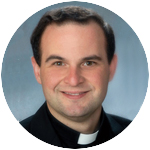
Father Eric J. Banecker
Lent has another name. And it’s one that is crucially important.
The word “Lent” itself is derived from a Germanic root referring to the “lengthening of days” or, in other words, springtime (and that’s the natural lengthening of days, not that which results from Benjamin Franklin’s worst invention, daylight savings time).
The word is used in English to refer to what the Romance languages call some version of Quadragesima, which means “the fortieth day,” leading up to the great feast of Easter.
But Lent has another name, one which does not refer to the calendar at all, but which refers to a spiritual calendar. The Rite of Christian Initiation of Adults calls this “the Period of Purification and Enlightenment.”
[hotblock]
Now, technically, this refers to the final period immediately before Baptism for the Elect, those who have been chosen for incorporation into the church via baptism. But except in rare circumstances, this period in the Catholic Church coincides exactly with the 40 days we call Lent. And then, at the Easter Vigil, this period culminates in the full initiation of thousands of men and women all over the world: from Atlanta to Caracas, from Manila to Madrid, from Kenya to the Vatican Hill.
Let me propose that this name – and its significance – can be a good lens through which all of us can look at these days. So many spiritual authors over the history of the church have referred in various ways to three stages of the spiritual journey.
The first is purification, when my eyes are opened to the powerful love of God and the need for sin to be rooted out of my life. The second is enlightenment or illumination, when one begins to grow in knowledge of who God is and what he has revealed to us. In the process, I gain a deeper understanding of his will for my life, even as I receive the grace to follow it more perfectly. Finally, there is union, an exalted state which is often reached only in the briefest of moments in this life – but offering a glimpse of eternal life.
We notice that the Rite of Christian Initiation of Adults places two of these stages, purification and enlightenment, at the heart of the Lenten season, both for those who are preparing for baptism and, by extension, all those who are already baptized. That’s because in this life, we never simply jump from one stage to the next.
[tower]
The circumstances of our lives constantly call us to reexamine our hearts so that God may continue to root all attraction to sin and vice out of us. This is not a process ever definitively completed in this life. A young priest once asked his wise old spiritual director when people stop experiencing temptation in their lives. The answer? “About five minutes after you’re dead.”
In this way, we see that our Lenten practices are not just mere self-improvement, a kind of second-chance at our New Year’s Resolutions. Nor are they asceticism for asceticism’s sake, as if the ability to survive on 1,000 calories a day qualified one as a disciple of Jesus Christ.
Instead, prayer, fasting and almsgiving draw us deeply into the mystery of the cross, which is a central theme of Lent. The cross is, in fact, both purification and enlightenment for each of us. Through Jesus’ sacrifice, each of us is offered the grace of reconciliation with God and forgiveness of sins both personal and original. The cross purifies us by making us right with God.
But the Paschal Mystery is also an illumination, an enlightenment. By reflecting upon the cross, we see what God’s love looks like on earth. It is a complete self-gift, and in a world infected with sin, it looks like an innocent man – the innocent man – hanging from a tree.
We all know that the church faces profound challenges right now. Many good people have walked away in anger or drifted away through indifference. Many who have stayed are upset and fearful: upset at the hypocrisy and mediocrity of the church’s leaders and fearful of an outside world with its cool hostility to the church and her teachings.
[hotblock2]
But Lent offers us a path out of this anger and fear to a place of hope. As the ancient prayer goes, Ave crux, spes unica: hail the Cross, our only hope. And if we keep our eyes fixed on it, then no challenge can distract us.
St. Paul was so focused on his mission that he let nothing, absolutely nothing, keep him from accomplishing it. That is why he was able to say, “I am convinced that neither death, nor life, nor angels, nor principalities, nor present things, nor future, nor powers, nor height, nor depth, nor any other create will be able to separate us from the love of God in Christ Jesus our Lord” (Rom. 8:38-39).
He didn’t say this because the church of the first century was filled with perfect people. He certainly didn’t say it because his world was friendly and supportive of the church. Rather, he said it because it’s true. He said it because no matter the challenges inside the church and outside, the most important work was the purification and enlightenment of our own hearts.
If we get that right, then all of the world’s challenges lose their power over us. This Lent, if we take the road of purification and enlightenment – that is, the road to Calvary – we can be assured that the empty tomb lies just beyond the cross.
***
Father Eric J. Banecker is parochial vicar at St. Pius X Parish in Broomall.



Share this story